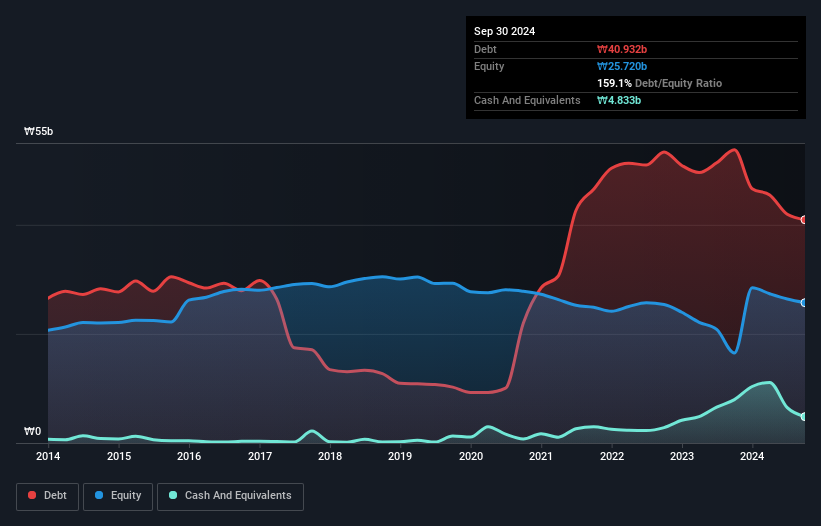
The external fund manager backed by Berkshire Hathaway's Charlie Munger, Li Lu, makes no bones about it when he says 'The biggest investment risk is not the volatility of prices, but whether you will suffer a permanent loss of capital.' When we think about how risky a company is, we always like to look at its use of debt, since debt overload can lead to ruin. As with many other companies Essen Tech Co., Ltd. (KOSDAQ:043340) makes use of debt. But is this debt a concern to shareholders?
Why Does Debt Bring Risk?
Debt and other liabilities become risky for a business when it cannot easily fulfill those obligations, either with free cash flow or by raising capital at an attractive price. Part and parcel of capitalism is the process of 'creative destruction' where failed businesses are mercilessly liquidated by their bankers. However, a more frequent (but still costly) occurrence is where a company must issue shares at bargain-basement prices, permanently diluting shareholders, just to shore up its balance sheet. Of course, debt can be an important tool in businesses, particularly capital heavy businesses. When we examine debt levels, we first consider both cash and debt levels, together.
See our latest analysis for Essen Tech
What Is Essen Tech's Debt?
As you can see below, Essen Tech had ₩40.9b of debt at September 2024, down from ₩53.8b a year prior. On the flip side, it has ₩4.83b in cash leading to net debt of about ₩36.1b.

How Strong Is Essen Tech's Balance Sheet?
We can see from the most recent balance sheet that Essen Tech had liabilities of ₩26.7b falling due within a year, and liabilities of ₩21.5b due beyond that. On the other hand, it had cash of ₩4.83b and ₩9.99b worth of receivables due within a year. So its liabilities total ₩33.4b more than the combination of its cash and short-term receivables.
This deficit is considerable relative to its market capitalization of ₩51.2b, so it does suggest shareholders should keep an eye on Essen Tech's use of debt. This suggests shareholders would be heavily diluted if the company needed to shore up its balance sheet in a hurry. The balance sheet is clearly the area to focus on when you are analysing debt. But it is Essen Tech's earnings that will influence how the balance sheet holds up in the future. So when considering debt, it's definitely worth looking at the earnings trend. Click here for an interactive snapshot.
Over 12 months, Essen Tech reported revenue of ₩52b, which is a gain of 6.1%, although it did not report any earnings before interest and tax. We usually like to see faster growth from unprofitable companies, but each to their own.
Caveat Emptor
Over the last twelve months Essen Tech produced an earnings before interest and tax (EBIT) loss. Indeed, it lost ₩3.4b at the EBIT level. Considering that alongside the liabilities mentioned above does not give us much confidence that company should be using so much debt. Quite frankly we think the balance sheet is far from match-fit, although it could be improved with time. However, it doesn't help that it burned through ₩6.4b of cash over the last year. So in short it's a really risky stock. When analysing debt levels, the balance sheet is the obvious place to start. However, not all investment risk resides within the balance sheet - far from it. Be aware that Essen Tech is showing 4 warning signs in our investment analysis , and 2 of those shouldn't be ignored...
When all is said and done, sometimes its easier to focus on companies that don't even need debt. Readers can access a list of growth stocks with zero net debt 100% free, right now.
Valuation is complex, but we're here to simplify it.
Discover if Essen Tech might be undervalued or overvalued with our detailed analysis, featuring fair value estimates, potential risks, dividends, insider trades, and its financial condition.
Access Free AnalysisHave feedback on this article? Concerned about the content? Get in touch with us directly. Alternatively, email editorial-team (at) simplywallst.com.
This article by Simply Wall St is general in nature. We provide commentary based on historical data and analyst forecasts only using an unbiased methodology and our articles are not intended to be financial advice. It does not constitute a recommendation to buy or sell any stock, and does not take account of your objectives, or your financial situation. We aim to bring you long-term focused analysis driven by fundamental data. Note that our analysis may not factor in the latest price-sensitive company announcements or qualitative material. Simply Wall St has no position in any stocks mentioned.
About KOSDAQ:A043340
Essen Tech
Provides brass alloy valves for refrigeration, air conditioning, gas, housing, automobile, and shipbuilding industries in South Korea.
Adequate balance sheet low.
Market Insights
Community Narratives



